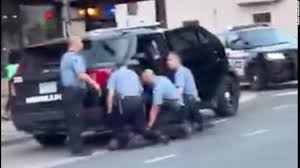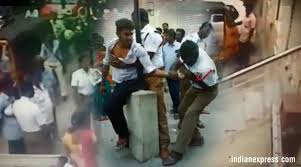Bad Policing is a Grave Pandemic
- Saleem Qamar Butt

- Jun 16, 2020
- 6 min read
“Oppressive violence and hatred may, ultimately, turn [the] sheep into wolves.”~ T.F. Hodge
The whole world saw USA leading among COVID-19 hit countries, but suddenly the death of George Floyd under the knee of a white policeman in Minneapolis changed the scene and not only the USA but most developed countries saw it overtaken by eruption of strong protests against racism and police brutalities termed police pandemic. “I can’t breathe”; George Floyd’s pleas awakened this world that has been rendered comatose by fear of contagion and all of a sudden nothing mattered but justice. Washington Post op-ed of 2014, "I’m a cop. If you don’t want to get hurt, don’t challenge me," captures an attitude toward policing that is not only common among U.S. law enforcement but in most parts of the world. Police brutality or police violence is legally defined as a civil rights violation where officers exercise undue or excessive force against a subject. This includes, but is not limited to, physical or verbal harassment, physical or mental injury, property damage, and death. Other factors that have been cited as encouraging police brutality include institutionalized systems of police training, management, and culture; a criminal-justice system that discourages prosecutors from pursuing police misconduct vigorously; a political system that responds more readily to police than to the public.
The mark of a good police department and the officers who work within it is that they continuously seek to handle their business more effectively and fairly, emphasizing preventing crime and disorder and not merely responding to it, and applying research and practical knowledge, using problem-solving methods. The globally accepted policing principles include accountability, fairness, honesty, integrity, leadership, objectivity, openness, respect and selflessness. The standard of professional behavior by police include honesty and integrity, equality and diversity, use of force, orders and instructions, duties and responsibilities, confidentiality, fitness for work, challenging and reporting improper conduct. Obviously it is a tall order that is hard for even for the top ten police forces in the world i.e. England (1), Canada, Netherlands, France, Japan, USA (6th), Australia, Germany, China and Italy.
Every country has their own way of dealing with the problem of corruption but one thing that is common in all is the maintenance of police force. Government thinks that the police force will tackle all problems related with law and order as well as corruption but in reality there are many countries that face the problem of corrupted police forces. This is generally because the policemen are underpaid in many countries and thus they take up corruption to earn more money; other reasons include disregard to the above stated principles and standards of good policing. According to one survey, the list of the 10 countries of the world where the police forces are extremely corrupt include Kenya, Myanmar, Iraq, Somalia, Afghanistan, Sudan, Russia, Pakistan, Haiti and Mexico. However, the global protests against racist police behavior in U.S. raise a pertinent question i.e. “is past of South Africa going to be future of America?” Yet another prickly query is for the sub-continent countries like India and Pakistan, “Why are there no mass demonstrations over the frequent cases of police brutality in both these countries?” In India, police brutalities especially against Muslims, other minorities and even against low caste Hindus are beyond imagination. In Pakistan, police misdemeanor barring rare exceptions is an everyday ordeal for the public. Needless to say that both countries inherited colonial police system put in place by the former colonial masters to subjugate the local subjects; ironically, England’s own police force stands at number 1 among best top ten. While Americans examine the role of racism in their society and how it impacts policing, the underlying factors behind excessive police force and corruption in India and Pakistan are more complicated, including the divisions created by religion, sects, caste, political influence, power, and wealth. Can any superficial police reforms by the system and elite that thrives on this corrupted to the core policing system make any difference? Perhaps not!
We may find pearls of wisdom in what is advised to POTUS Trump by Mikheil Saakashvili in an article dated 11th June 2020, who is head of the National Reform Council of Ukraine and was president of Georgia from 2004 to 2013. He says, “I abolished and rebuilt the police. The United States can do the same”. He goes on to say, “After Georgia’s Rose Revolution in 2004, I became president of a failed state. Law enforcement agencies functioned like criminal gangs. Officers demanded bribes, trafficked narcotics and weapons, and worked for political and business elites as a mercenary security force. Georgia was a textbook example of “predatory policing”: Police did not perform the basic responsibilities of ensuring public safety, instead enriching themselves and their patrons by extorting citizens. A 2003 survey found that just 2.3 percent of Georgians held a positive view of police. In just a few years, we transformed this—offering a model for other countries, such as the United States, struggling with police reform. The corruption of law enforcement empowered organized criminals, known in the former Soviet Union as “thieves in law,” to fill the void. Gang leaders served not only as de facto police but also as judge, jury, and executioner. Given that reality, police reform was not only a matter of restructuring institutions or implementing better policies. We had to change the mentality of a broken, cynical, and fearful society. Before people could begin to trust the police, we—the new political elites—had to earn their trust. Challenging the status quo was not enough. We had to destroy it and build something better. And we had to do it quickly. After the Rose Revolution, Georgian society united to demand reform. Reforms mean nothing without results that people can see. The first priority was to seize back control of state security functions from organized crime. Over a billion dollars’ worth of stolen property was recovered from thieves and returned to the state budget. New police stations were built all over Georgia, with floor-to-ceiling glass. This wasn’t just an aesthetic choice—building trust in law enforcement requires transparency. Simultaneously, we dismantled the Soviet legacy of politicized policing and replaced it with equitable law enforcement. We eliminated redundant agencies and those beyond hope of rehabilitation. The Ministry of State Security, a KGB relic, was dissolved. We disbanded the Traffic Police, firing every one of the thousands of officers who had acted as state-sanctioned highway robbers. We replaced them with an entirely new force of Patrol Police, who had no background in law enforcement and thus no ties to old, corrupted elites. Recruits had to pass a competitive examination and complete a course in criminal procedure code. They were trained in persuasion, negotiation, and mediation skills to minimize the use of force. In re-staffing the streamlined law enforcement agencies, we chose quality over quantity. The total number of Ministry of Internal Affairs’ employees decreased from around 56,000 to 33,000. Violent crime fell by 66 percent after reforms were implemented. Carjacking and auto thefts, once commonplace, nearly disappeared and the overall crime rate dropped by over 50 percent, making Georgia one of the world’s safest countries in the world. We hadn’t needed so many police. We only needed good police. Before my presidency, police officers were paid just $44 per month—with the unspoken expectation that they would supplement their meager incomes with bribes. By reducing the size of the force, jettisoning agencies and ministries, and hiring only qualified candidates, we increased salaries of police officers nearly tenfold. Now that officers were fairly compensated, we enforced zero tolerance for corruption. Public employees did not enjoy any special treatment from the criminal justice system. The Ministry of Internal Affairs created a reality TV show to broadcast raids at the homes of corrupt officers. With these tactics, some time-tested and some unconventional, we managed to break the backbone of the post-Soviet patronage system.” It seemed Mr. Saakashvili was describing ills associated with Pakistan’s police--may be for all countries suffering from bad policing.
If PTI government really wants to make a longer lasting positive impact on Pakistani society, then comprehensive judicial reforms and a fresh system of policing has to be created based on fresh laws by ditching the old colonial system as achieved by former Georgian leader; It will serve the country well as well as help PTI to fulfill its main promise of providing justice to the common man. It goes without saying that a patchy, half hearted, self serving and cosmetic touch to improve the quagmire of existing corrupt system is not repeated not desired. Creative destruction requires a better replacement for the current system. A new system from grassroots’ level has been awaited for over seven decades. PM Imran Khan has to go for it even by hiring services of strategists like Mr. Mikheil Saakashvili rather than expecting the old hands to do new tricks.
13th June 2020
. Saleem Qamar Butt, SI (M), (R) is a senior Army officer with rich experience in International relations, military diplomacy and analysis of geo-political and strategic security issues. (Website: www.sqbutt.com )










Comments